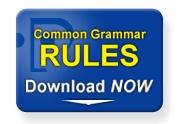 The bounds of civility seem to be eroding faster than a sandcastle in a tsunami. Nowhere is this more evident than in social media. Any public forum in which readers can comment on another’s posting has become fertile ground for nit-picking, tongue-lashings, biting sarcasm and just plain rudeness — and more frequently, grammar bashing.
The bounds of civility seem to be eroding faster than a sandcastle in a tsunami. Nowhere is this more evident than in social media. Any public forum in which readers can comment on another’s posting has become fertile ground for nit-picking, tongue-lashings, biting sarcasm and just plain rudeness — and more frequently, grammar bashing.
On one end of the spectrum are the grammar trolls — those who delight in pointing out others’ typos, punctuation errors and incorrect word choices. On the other are those whose comments seemingly are intended to gently correct the misuse and teach the offender to avoid embarrassment in the future. Although most would agree trolling is unacceptable, is correcting others’ grammar otherwise OK?
As ever, it depends — on your intention, your relationship with the offender, the impact of the error and how you go about correcting it.
The Road to a Really Hot, Unpleasant Place …
… is paved with good intentions. So you’re a grammar nerd. You love the English language and want to do your part in preserving it to ensure clear communication. Hey, I’m right there with you. But even if you notice errors everywhere, you don’t have a duty to point them out, however gently you might go about doing that. In fact, correcting others’ errors can do more harm than good, leading those you’re correcting to clam up or lash out, both of which obviously impede communication.
If your intention really is to help, a better approach is to model good grammar in both your speaking and writing and to offer help only when someone asks. Are there exceptions? Of course.
When It’s OK
I’ve always corrected my son’s grammar — in private. I want him to learn but wouldn’t dream of embarrassing him in front of his friends. Grammar-nerd parents not only get to, but should, correct their children’s grammar. As should teachers, because that’s their job. Correcting work colleagues or employees is acceptable when the error would create a problem if left as is (more on this below). It’s also obviously OK to correct a spouse or friends who have asked you to do so (but it can backfire if you find yourself correcting them constantly — choose your opportunities wisely).
What Impact Will the Error Have?
If you encounter numerous typos in a friend’s Facebook post on her personal page, should you let her know? What if the post is on the Facebook page for her business? What if the errors are in a business’s brochure (or sign, menu, etc.) and you have no relationship with the business?
The “what if” scenarios are endless, making specific answers impossible. But some general guidelines might be useful. If you notice an error that will make your company look bad, by all means point it out in a private communication with the responsible person and provide a simple (i.e., nondidactic) explanation for the suggested change.
Regarding menu typos and the like, as annoying as you might find them, ask yourself what impact the errors have. Marinara misspelled as marinaria might not be a big deal, but the owner probably wouldn’t want to advertise the unappetizing shrimp and pest (read: pesto) quesadilla.
What about correcting that friend’s Facebook post? Depends on the friend and your relationship with her. Maybe she’s dyslexic or doesn’t care one iota about typos. As hard as that might be to swallow, don’t say anything. If it doesn’t matter to her, it shouldn’t matter to you. If it’s someone you don’t know well, you can’t measure the potential impact, so don’t say anything.
In short, if you’re not sure how the person would take the correction and the error doesn’t have a measurable impact, it’s probably best to mentally correct the problem and leave it at that.
How to Correct Another’s Grammar
Once you’ve decided it’d be a good idea to make someone aware of his or her error, what’s the best way to deliver that information? The golden rule can be helpful here: Correct someone in a way you wouldn’t mind someone using with you. For most people, that’s in private. It’s also polite and constructive.
Opening the conversation with “I’m not sure anyone has told you …,” “I thought you might want to know …” or “Would you mind if I offered a suggestion?” are gentle ways of letting the person know you want to help — far more likely to generate a positive response than “Your sign has a major typo,” “You need to fix this error” or “You probably want to fix that mistake.”
***
When, if ever, do you think it’s OK to correct someone’s grammar? Have you ever done that, and, if so, what kind of response did you receive? What advice do you have for approaching someone about a grammar mistake? Have you ever made an error you wished someone would have pointed out? Let us know in the comments below.




